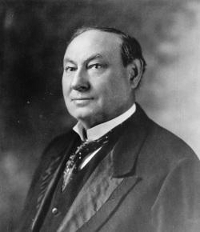![]()
Wiley was the main force behind passage of the landmark “Pure Foods and Drugs Act” of 1906. He was a Purdue University chemist with a medical degree who had served in the Union Army during the Civil War when in 1882 at age 37 he accepted an appointment as Chief Chemist in the U.S. Department of Agriculture.
There he developed tests for food purity and worked behind the scene to build pressure on Congress to pass legislation to deal with widespread adulteration of food and drugs. In 1902, he began studying the health effects of food preservatives in groups of young men called the “Poison Squad” by the press.
Wiley was assigned responsibility for enforcing the new law, but encountered opposition both within and outside the government. In 1907 and 1911 he published two editions of his “Foods and their Adulteration.” In 1912, he resigned to run the laboratories of Good Housekeeping magazine where he developed their Seal of Approval. Wiley is buried with his wife in Arlington National Cemetery.
References:
- FDA biography
- Wikipedia biography
- Arlington National Cemetery biography
- Chemical Heritage Foundation biography
- biography in Toxicological Sciences
- full text of Wiley’s “History of a Crime Against the Food Law” (1929)
- 17 page excerpt from Wiley’s Autobiography (1930)
- Wiley’s papers at Hanover College in Indiana
- The Politics of Purity: Harvey Washington Wiley and the Origins of Federal Food Policy by Clayton A. Coppin and Jack High
